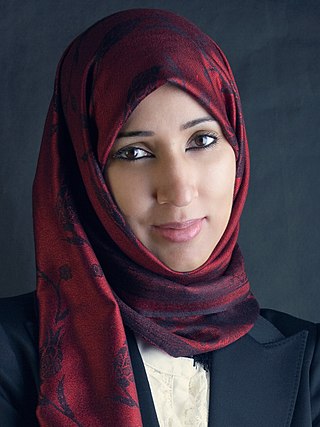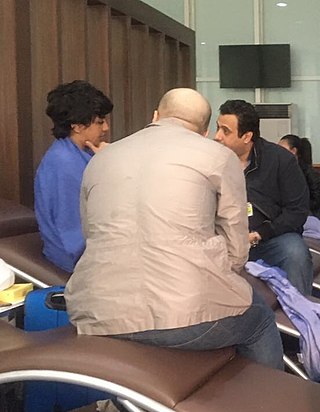Related Research Articles

Human Rights Watch (HRW) is an international non-governmental organization headquartered in New York City that conducts research and advocacy on human rights. The group pressures governments, policymakers, companies, and individual human rights abusers to denounce abuse and respect human rights, and often works on behalf of refugees, children, migrants, and political prisoners.

Human rights in Saudi Arabia are a topic of concern and controversy. Known for its executions of political protesters and opponents, the government of the Kingdom of Saudi Arabia has been accused of and denounced by various international organizations and governments for violating human rights within the country. An absolute monarchy under the House of Saud, the government is consistently ranked among the "worst of the worst" in Freedom House's annual survey of political and civil rights and was in 2023 ranked as the world's most authoritarian regime.

Sharon Kang Hom is the Executive Director of Human Rights in China, adjunct professor of law at the New York University School of Law, and Professor of Law Emerita at the City University of New York School of Law. Hom taught law for 18 years, including training judges, lawyers, and law teachers at eight law schools in China. Her non-law book publications include Chinese Women Traversing Diaspora: Memoirs, Essays, and Poetry (ed.,1999). In 2007, she was named by the Wall Street Journal as one of the "50 Women to Watch" for their impact on business. Born in Hong Kong, she lives in New York with her family.

Human rights in Yemen are seen as problematic. The security forces have been responsible for torture, inhumane treatment and even extrajudicial executions. In recent years there has been some improvement, with the government signing several international human rights treaties, and even appointing a woman, Dr. Wahiba Fara’a, to the role of Minister of the State of Human Rights.

Women's rights in Saudi Arabia is a topic of concern and controversy internationally. Saudi women have experienced major legal rights reforms since 2017, after facing Wahhabi religious fundamentalist dominance for decades.

Isobel Coleman is an American diplomat, author, entrepreneur, and former management consultant. In November 2021, Coleman was sworn in as Deputy Administrator for Policy and Programming at the United States Agency for International Development. As Deputy Administrator, she guides USAID’s crisis response, leads its work in countering the influence of China and Russia, and supports efforts to address the root causes of irregular migration. She also is responsible for overseeing Agency efforts to prevent famine and future pandemics; strengthen education, health, democracy, and economic growth; and improve responses to climate change.

Tawakkol Abdel-Salam Khalid Karman is a Yemeni Nobel Laureate, journalist, politician, and human rights activist. She leads the group "Women Journalists Without Chains," which she co-founded in 2005. She became the international public face of the 2011 Yemeni uprising that was part of the Arab Spring uprisings. In 2011, she was reportedly called the "Iron Woman" and "Mother of the Revolution" by some Yemenis. She is a co-recipient of the 2011 Nobel Peace Prize, becoming the first Yemeni, the first Arab woman, and the second Muslim woman to win a Nobel Prize.

Eman al-Nafjan is a Saudi Arabian blogger and women's rights activist. She was detained by Saudi authorities in May 2018 along with Loujain al-Hathloul and five other women's rights activists in what Human Rights Watch interpreted as an attempt to frighten her and the other activists, during the 2018–2019 Saudi crackdown on feminists.

Manal al-Sharif is a Saudi women's rights activist who helped start a right to drive campaign in 2011. Wajeha al-Huwaider filmed al-Sharif driving a car as part of the campaign. The video was posted on YouTube and Facebook. Al-Sharif was detained on 21 May 2011, released, and then rearrested the following day. On 30 May, al-Sharif was released on bail, on the conditions of returning for questioning if requested, not driving, and not talking to the media. The New York Times and Associated Press associated the women's driving campaign as part of the Arab Spring and the long duration of al-Sharif's detention due to Saudi authorities' fear of protests.

Until June 2018, Saudi Arabia was the only country in the world in which women were forbidden from driving motor vehicles. The Women to Drive Movement was a campaign by Saudi women, whom the government denies many rights to which men are entitled, for the right to drive motor vehicles on public roads. Dozens of women drove in Riyadh in 1990 and were arrested and had their passports confiscated. In 2007, Wajeha al-Huwaider and other women petitioned King Abdullah for the right to drive, and a film of al-Huwaider driving on International Women's Day 2008 attracted international media attention.

Sarah Attar is a Saudi-American track and field athlete who competed at the 2012 Summer Olympics as one of the first two female Olympians representing Saudi Arabia. She also competed in the marathon at the 2016 Olympics.
Dissidents have been detained as political prisoners in Saudi Arabia during the 1990s, 2000s, 2010s and 2020s. Protests and sit-ins calling for political prisoners to be released took place during the 2011–2012 Saudi Arabian protests in many cities throughout Saudi Arabia, with security forces firing live bullets in the air on 19 August 2012 at a protest at al-Ha'ir Prison. As of 2012, recent estimates of the number of political prisoners in Mabahith prisons range from a denial of any political prisoners at all by the Ministry of Interior, to 30,000 by the UK-based Islamic Human Rights Commission and the BBC.
Nathalie Morin is a Canadian citizen, born in Quebec, who has been living in Saudi Arabia with her partner, Saeed Al Shahrani since 2005. She claims that she is physically and psychologically mistreated with her four children. She has stated that she "does not have any friend[s]" in Saudi Arabia and is shunned because of her foreign roots. She refuses to leave Saudi Arabia as her husband has custody of their children.

Agnès Callamard is a French human rights activist who is the Secretary General of Amnesty International. She was previously the Special Rapporteur on extrajudicial, summary, or arbitrary executions appointed by the United Nations Human Rights Council, and the former Director of the Columbia University Global Freedom of Expression project.

Loujain al-Hathloul is a Saudi women's rights activist, a social media figure, and political prisoner. She has been arrested on several occasions for defying the ban on women driving in Saudi Arabia. In May 2018, she and several prominent women's rights activists were kidnapped in the United Arab Emirates (UAE) and deported to Saudi Arabia where they were charged with "attempting to destabilise the kingdom." Her ex-husband, Saudi stand-up comedian Fahad al-Butairi, had also been forcibly returned from Jordan to the Kingdom and was under arrest.

Holly Williams is an Australian foreign correspondent and war correspondent who has worked for CBS since 2012. Prior to that, she worked for BBC News, CNN, and Sky News.

Dina Ali Lasloom is a Saudi woman who attempted to seek asylum in Australia to escape Saudi guardianship laws, but was forcibly repatriated to Saudi Arabia from the Philippines. She was stopped in transit at Ninoy Aquino International Airport in Manila on 10 April 2017 and sent back to Saudi Arabia on 11 April 2017.

Aziza al-Yousef is a Saudi Arabian women's rights activist and academic. She was detained by Saudi authorities in May 2018 along with Loujain al-Hathloul and five others.
Feminism in Saudi Arabia dates back to the ancient, pre-Roman Nabataean Kingdom in which women were independent legal persons. Twenty-first century feminist movements in Saudi Arabia include the women to drive movement and the anti male-guardianship campaign. Madawi al-Rasheed argued in 2019 that the Saudi feminist movement was "the most organised and articulate civil society" in Saudi Arabia.

The Chinese government is committing a series of ongoing human rights abuses against Uyghurs and other ethnic and religious minorities in Xinjiang that is often characterized as persecution or as genocide. Beginning in 2014, the Chinese government, under the administration of Chinese Communist Party (CCP) General Secretary Xi Jinping, incarcerated more than an estimated one million Turkic Muslims without any legal process in internment camps. Operations from 2016 to 2021 were led by Xinjiang CCP Secretary Chen Quanguo. It is the largest-scale detention of ethnic and religious minorities since World War II. The Chinese government began to wind down the camps in 2019. Amnesty International states that detainees have been increasingly transferred to the formal penal system.
References
- 1 2 3 4 5 "Minky Worden". Human Rights Watch. 2008-06-24. Retrieved 2017-10-07.
- ↑ Worden, Minky (October 23, 2009). "What an Olympic glow can't mask". The Washington Post. Retrieved 9 October 2010.
- ↑ "Mary S. Worden | Columbia | SIPA". sipa.columbia.edu. Retrieved 2017-10-07.
- ↑ Morrow, Lance (January 29, 2006). "Necessity or Atrocity?". The New York Times.
- ↑ The Unfinished Revolution: Voices from the Global Fight for Women's Rights via www.amazon.com
- ↑ China's Great Leap: The Beijing Games and Olympian Human Rights Challenges via www.amazon.com
- ↑ Torture via www.amazon.com
- ↑ "Saudi sports reforms give girls in the kingdom a running start". Women in the World in Association with The New York Times - WITW. 2017-09-07. Retrieved 2017-10-07.
- ↑ Garcia, Ahiza. "She conquered Everest. Now she's tackling Saudi laws that keep women out of sports". CNNMoney. Retrieved 2017-10-07.
- ↑ Worden, Minky. "Beach volleyball and women's rights in Iran? - CNN". CNN. Retrieved 2017-10-07.
- ↑ Worden, Minky (2015). "Opinion | Human Rights and the 2022 Olympics". The New York Times. ISSN 0362-4331 . Retrieved 2017-10-07.
- ↑ "Raising the Bar". Human Rights Watch. 2015-01-26. Retrieved 2017-10-07.
- ↑ "Minky Worden: Russia's anti-gay laws threaten the Olympics' character". Washington Post. Retrieved 2017-10-07.
- ↑ Worden, Minky (2013-08-12). "Opinion | The Olympics' Leadership Mess". The New York Times. ISSN 0362-4331 . Retrieved 2017-10-07.
- ↑ "In Saudi Arabia, women are confined by technology". Washington Post. Retrieved 2017-10-07.
- ↑ "The View from the Empire State Building". msnbc.com. 2001-10-20. Retrieved 2017-10-07.
- ↑ "L. Gordon Crovitz: Publisher of the Wall Street Journal". ScribeMedia.org. 2006-11-21. Retrieved 2009-04-16.